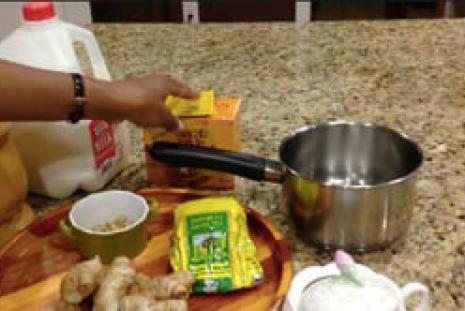(Wakati wowote ni wakati wa chai. Maelekezo ya kutengeneza chai) Any time is tea time. Knowing how to make and serve tea is an important aspect of entertaining one self and one's guests in East Africa. The following video shows one way of making tea that is popular among the region's tea drinkers.
Any time is tea time. Directions on how to make tea.
Lesson Vocabulary
Lesson Vocabulary
| au | or | ||
| biskuti | biscuit | ||
| chai | tea | ||
| chemka | (be) boiling | ||
| chemsha | cause to boil | ||
| chuja | sift | ||
| halafu | (and) then | ||
| hiliki | black cardamom | ||
| hitaji | need | ||
| ikishachemka | after it has boiled | ||
| jinsi | how to | ||
| karibuni | welcome (all) | ||
| katakata | cut repeatedly | ||
| katika | in | ||
| kidogo | a little | ||
| kisha | (and) then | ||
| koroga | stir | ||
| korosho | cashew nuts | ||
| kunywa | drink | ||
| kwanza | first | ||
| mahitaji | needs | ||
| majani | leaves | ||
| maji | water | ||
| maziwa | milk | ||
| mimina | pour into | ||
| ongeza | add | ||
| pamoja | together | ||
| peke yake | alone | ||
| penda | like/love | ||
| sababu | because/reason | ||
| subiri | wait | ||
| sukari | sugar | ||
| tangawizi | ginger | ||
| tayari | ready | ||
| tena | again | ||
| tengeneza | make/fix | ||
| tia | put | ||
| tujifunze | let's learn | ||
| twanga | pound | ||
| wakati | time | ||
| wakati wowote | any time | ||
| weka | put | ||
| weza | be able |
Lesson Conversation:
| Hamisi | Unapenda chai? | Do you like tea? | |
| Ali | Ndiyo. Ninapenda kunywa chai wakati wowote. | Yes. I like to drink tea any the time. | |
| Hamisi | Unapenda chai ya aina gani? | What kind of tea do you like? | |
| Ali | Ninapenda chai ya rangi yenye tangawizi na nanaa na sukari. | I like black tea with ginger, mint and sugar. | |
| Hamisi | Mimi ninapenda aina hiyo pia lakini ninaweka asali badala ya sukari. | I like that kind too but I put honey instead of sugar. | |
| Ali | Unatumia chai ya aina gani? Umewahi kunywa chai kutoka Kenya? | What kind of tea do you use? Have you ever drank tea from Kenya? | |
| Hamisi | Niliwahi kuinywa siku moja nyumbani kwa rafiki yangu Mkenya na nikaipenda. Inapatikana wapi? | I drank it one day at a friend's house who is from Kenya and I liked it. Where can I find it? | |
| Ali | Inapatikana katika duka moja la Mkenya fulani huko mjini Boston. Nitaulizia na nitakutumia ujumbe. | It is found in one shop owned by a Kenyan in the city of Boston. I will ask around and send you a message. | |
| Hamisi | Nitashukuru sana. Asante sana. Siku njema! | I will be grateful. Thank you very much. Good day! | |
| Ali | Si kitu. Siku njema! | It nothing. Good day! | |
| MAZUNGUMZO YOTE: | SIKILIZA MAZUNGUMZO YOTE KWA PAMOJA | Listen to the entire conversation |
Lesson Monologue
Lesson Note
Grammar Notes
| Grammar |
|
Negation of relative: The present tense: Relative verbs are negated by simply inserting -si- in the case of present tense. For example, becomes --> Asiyeandika 'one who does not write' With the past and future tenses, the verb inflected with relative marker cannot be negated. Rather, the amba_ word must be used:
The Relative amba__ 'that/which'
|
|||||||||||||||||||||||||||||||||||

